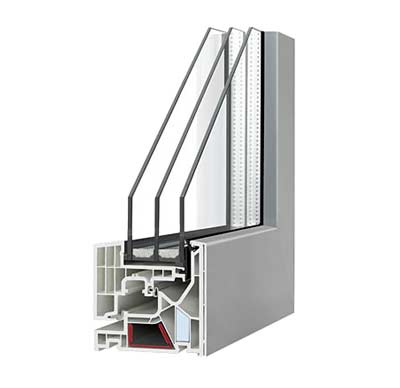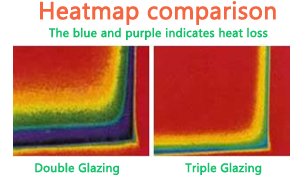I think you’ll agree with me when I say: Greater home efficiency means saving money.
Well, as it happens, you can drastically increase the efficiency of your house by upgrading to triple glazing.
But what is triple glazing? And how much does it cost?
What is triple glazing?
Simply, triple glazing is exactly what it sounds like, the use of three panes of glass in a window. The majority of houses use either single glazing, or double glazing. However triple glazing is becoming an increasingly attractive prospect for those looking to make their homes more energy efficient.
But how does triple glazing do that?
Each of the three panes of glass is separated by an inert gas such as argon or krypton which prevents the escape of heat through convection.
Because more heat is trapped within the home there is less need to spend money on keeping your extension or conservatory and other space warm.
Double glazing works in a similar fashion but there is only one layer of argon gas trapped in between two panes.
Single glazing is by far the least energy efficient type of glazing, offering only a single pane of glass to prevent heat escaping.

But, what are argon and krypton gases?
Argon and krypton are noble gases; their physical properties mean they make great insulators. They are also extremely safe, due to the fact that they do not react with other elements.
As such, noble gasses are used in a number of everyday applications, such as lightbulbs and air tanks. Their use in triple glazing is the latest in a long line of innovative technological advancements both on a domestic and industrial scale.
Get in contact with glazing installers for triple glazing. Get your glazing quotes here.
What is the u-value of triple glazing?
Firstly, a U-value is the unit of measurement given to heat transmission through a material. The U-value represents how effective a wall or window is at preventing heat loss. Simply, the lower a material’s U-value the better it is as an insulator and the more efficient it will be.
On average the U-value of a 44mm thick triple glazed window is 0.6, whereas double glazing (the most common type of glazing) has a thickness between 1.8 to 2.8.
So in terms of U-Value there is a considerable difference when comparing triple and double glazing. However, these values change depending on the age/type of double glazing you may have so it is important to double check.
The high U-value makes it worth to invest in triple glazing.
What are the benefits of triple glazing?
There are quite a few advantages to triple glazing…
1. Lower cost of heating; Due to its superior U-value, triple glazing offers, in for example uPVC bay windows or bi-fold doors unparalleled levels of insulation. Because of this it reduces the cost taken to heat your home as less heat is lost to the outside.
2. Adds extra level of security: Triple glazing is considerably thicker and heavier than double glazing. As such, it offers the owner an extra level of security from those looking to break into the property.
3. Reduces (road) noise from surroundings: Triple glazing also serves as a good (traffic) noise canceller. It is the most efficient form of glazing at reducing the level of external sounds entering the property.
Do you want to save on energy costs and create a more comfortable home? Opt for triple glazing and request quotes from local glazing installers.
What are the disadvantages of triple glazing?
Unfortunately, there are also a few cons.
Heavier than double glazing: Triple glazing is substantially heavier than double glazing, in some instances this renders it unsuitable for certain properties.
More expensive: Triple glazing is considerably more expensive than double glazing. It is worth noting that depending on the size and scale of the project triple glazing is not always the right option. More about the costs under the heading ‘How much does triple glazing cost?’.
Reduction in sunlight: Does triple glazing keep heat out? Triple glazing drastically reduces the intake (solar gain) of natural light into a property. This is called solar gain. Because of this triple glazing can affect the overall lighting inside of a building.
Triple glazing will also affect reduce the amount of natural heat entering the property on sunnier days from outside.
Double glazing vs triple glazing?
The most striking difference between double and triple glazing are the costs. But there are more differences.
Insulation: It is clear that triple glazing serves to insulate a property better and also reduces the amount of noise entering a property.
However, double glazing will allow a property to naturally warm up through natural sunlight.

Source photo: treforestglass.co.uk/super-low-u-value/
Weight: In some instances the additional weight of triple glazing makes them unsuitable for your existing window frames. It is always important that this is considered before investment.
When you invest in triple glazing, it is recommended to invest in new uPVC windows, as well. The new generation of uPVC windows are more energy efficient. Here you can read more about energy efficient windows and how they can benefit you.
However, because triple glazing weighs more, it also means that it is more ‘burglar proof’ than double glazing.
Burglaries: Triple glazing allows extra protection from thieves by being thicker, which adds an extra level of home security.
Condensation: The final key difference between double glazing and triple glazing is how they deal with condensation.
Condensation occurs when the internal temperature of a home drastically differs from the temperature outside.
Condensation build-up can potentially cause damage to a property by creating areas of dampness inside the home. Triple glazed windows reduce the likelihood of condensation and are much less likely to cause condensation than double glazed windows.
This is because triple glazed windows, in for example sash windows maintain a similar temperature to the rest of the property whereas double glazing creates a cold spot where heat can escape.
How much does triple glazing cost?
Triple glazing has many benefits, such as having one of the best insulation values. But because of these benefits the average costs of installing triple glazing is higher than double glazing.
But what are the costs?
The average costs below include VAT, triple glazing and labour costs.
| Per square meter | £320 |
| Average size window | £500 |
| House types | |
| Flat (with 2 bedrooms) | £1,950 |
| Terraced | £2,600 |
| Semi-detached | £4,000 |
| Detached | £7,000 |
Contact glazing installers for an exact quotation. Get free triple glazing quotes now.
Getting quotes from glazing installers
It has never been easier to get a quote from glazing installers. With more and more people becoming aware of making their homes more efficient, the demand for triple glazing has increased.
Get your glazing quotes today. Install energy efficient triple glazing and start saving on your energy bill tomorrow.